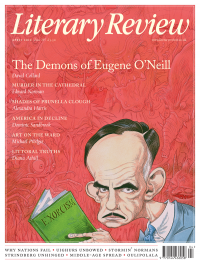Jonathan Beckman
Peradventurers
Threads and Traces: True False Fictive
By Carlo Ginzburg (Translated by Anne C Tedeschi and John Tedeschi)
University of California Press 328pp £20.95
Traces Remain: Essays and Explorations
By Charles Nicholl
Allen Lane/The Penguin Press 318pp £20
It is common to find reviewers these days griping about the ‘perhapses’ and ‘probablys’ that hedge history books. I’ve never understood this complaint. It would be marvellous if we had been endowed with all-encompassing archives, and if memories were not subject to the attrition of time and self-interested fabrication – but since we live in a fallen world, it seems wiser and more humble to recognise the limits of our knowledge than to pretend that historical record is complete and uncomplicated. Montaigne, the patron saint of quizzically raised eyebrows, thought so too: ‘I am drawne to hate likely things,’ he wrote (in John Florio’s translation), ‘when men goe about to set them downe as infallible. I love these words or phrases, which mollifie and moderate the temeritie of our propositions: “It may be,” “Peradventure,” “In some sort,” “Some,” “It is saide,” “I think,” and such like.’ Carlo Ginzburg and Charles Nicholl are masterful practitioners of subjunctive history, finding intellectual excitement in those cases from which it’s hardest to draw conclusions or generalisations, but never falling into the despair of scepticism.
Ginzburg’s The Cheese and the Worms (1976), despite being only 120 pages long, has a strong claim to being the most influential history book of the second half of the twentieth century. It reconstructs the mental world of Menocchio, a sixteenth-century Friulian miller whose heretical beliefs led to his execution

Sign Up to our newsletter
Receive free articles, highlights from the archive, news, details of prizes, and much more.@Lit_Review
Follow Literary Review on Twitter
Twitter Feed
Under its longest-serving editor, Graydon Carter, Vanity Fair was that rare thing – a New York society magazine that published serious journalism.
@PeterPeteryork looks at what Carter got right.
Peter York - Deluxe Editions
Peter York: Deluxe Editions - When the Going Was Good: An Editor’s Adventures During the Last Golden Age of Magazines by Graydon Carter
literaryreview.co.uk
Henry James returned to America in 1904 with three objectives: to see his brother William, to deliver a series of lectures on Balzac, and to gather material for a pair of books about modern America.
Peter Rose follows James out west.
Peter Rose - The Restless Analyst
Peter Rose: The Restless Analyst - Henry James Comes Home: Rediscovering America in the Gilded Age by Peter Brooks...
literaryreview.co.uk
Vladimir Putin served his apprenticeship in the KGB toward the end of the Cold War, a period during which Western societies were infiltrated by so-called 'illegals'.
Piers Brendon examines how the culture of Soviet spycraft shaped his thinking.
Piers Brendon - Tinker, Tailor, Sleeper, Troll
Piers Brendon: Tinker, Tailor, Sleeper, Troll - The Illegals: Russia’s Most Audacious Spies and the Plot to Infiltrate the West by Shaun Walker
literaryreview.co.uk